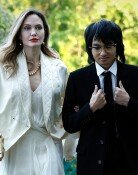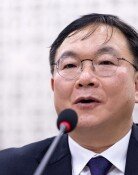Star CEOs Fuel Samsung Electronics Success
Star CEOs Fuel Samsung Electronics Success
Posted October. 21, 2008 09:32,
Samsung Electronics, the flagship company of the Samsung Group, owes its stellar global success to a legion of talented top executives.
Samsung Electronics President and CEO Lee Yoon-woo is one of the greatest contributors to developing the semiconductor business, the field that forms the backbone of the Korean economy.
As a director at Samsung Semiconductor & Telecommunications (now part of Samsung Electronics) in 1984, he shortened the construction period of a semiconductor plant from an average of three years to six months with his unique decisiveness.
Instead of scaling back when the semiconductor business suffered a rough patch, he had the foresight to raise investment in memory chip production. After serving as chief technology officer at Samsung Electronics, he landed the highest position at the company in May this year.
Vice Chairman Lee Ki-tae, in charge of external relations, is behind the worldwide success of Samsungs mobile phone handsets that has raised Koreas profile abroad. He is committed to new product and technology development with the aim to create the worlds first and best.
His drive has resulted in the production of TV and MP3 player-enabled handsets, a prime example of digital convergence. He is best known for his prompt decision-making under a management philosophy of pursuing optimal harmony at every department to achieve the best results.
Lim Hyung-gyu, in charge of new business development, is a Samsung-nurtured engineer who made D-RAM flash memory chips, the core business of the company, the worlds best. He has seen the fastest rise through the ranks after becoming the first engineer to receive a doctorate in electronic engineering through the groups academic training program.
Since October last year, he has searched for the next big breakthrough to create profit in the years to come.
Lee Sang-wan has headed the companys LCD business since the 1990s. The industry sees him as a next-generation leader in the global display market. Under his leadership, Samsung Electronics has led the global LCD sector for six consecutive years between 2002 and last year. He is also the first president of the Korea Display Industry Association, a post he assumed last year.
Chief Financial Officer Choi Do-suk is a leading financial expert in charge of managing the companys annual sales of 100 trillion won (76 billion U.S. dollars). With strong restructuring and innovation efforts, he pulled the company out of a capital crunch during the Asian financial crisis. He is known as an executive of many qualities including decisiveness, accurate judgment, and thorough planning ability.
Korean semiconductors have flourished on the world stage all thanks to Chief Technology Officer Hwang Chang-gyu. In 1989, he passed up a lucrative offer from a foreign competitor to join Samsung Electronics with the aim of beating Koreas archrival Japan in the field.
Hwang has pioneered new markets for semiconductors since announcing a new growth theory for the industry widely known as Hwangs rule in 2002.
Kwon Oh-hyun, head of Samsung`s semiconductor division, has extensive experience in both memory chips and system LSI (non-memory chip sector). He has helped narrow the technological gap between Korea and leading competitors Japan and the United States by developing four-mega D-RAM chips in 1988.
Kwon has made all four of Samsungs LSI business sectors number one in the world.
Choi Ji-sung, chief of Samsung`s information and communication division, is one of the men behind Global Samsung with experience in numerous divisions including semiconductors, digital media and information and communication.
Samsungs flagship LCD Bordeaux TV has seen great success on the global digital TV market thanks to Choi. His efficient work style has earned him the nickname German soldier, referring to his stint as the sole staff member at the companys Frankfurt office in 1985. Back then, he achieved semiconductor chip sales of one million dollars in his first year after memorizing a 1,000-page technology manual from cover to cover.
Park Jong-woo, president of Samsung`s digital media division, joined the company in 1992 as a researcher in semiconductor development. He entered top management in 2001 by taking over the companys printing business. Since becoming the head of the digital media division in January last year, he has led a transformation of the global TV market landscape.
Under his leadership, Samsung Electronics expanded its market share in the global LCD TV market from 13.5 percent in 2006 to 20.4 percent in the second quarter of this year.
In July last year, Samsung Electronics welcomed Choi Chi-hun, president of Samsung`s digital-printing division who had previously served as the Asia-Pacific regional head at GE Energy. In recognition of his outstanding business and management skills, he was promoted from a vice president to a president in May, less than one year after joining the company.
He is the youngest CEO of the company to take the helm of the business-to-business (B2B) printing division.
○ CEOs behind Global IT Samsung
Samsung SDI President Kim Sun-taek has transformed his company from a smokestack business rolling out cathode-ray tubes to a digital business encompassing production of cutting-edge LCD and OLED. Making the companys electric cells second in the world, he has aggressively pursued a share of the growing energy market including photovoltaic and fuel cells. He says he wants to become a pioneer in the energy market after his success in the display market.
Samsung SDI Chief Technology Officer Kim Jae-uk is a field-oriented CEO who exercises his leadership skills on the production line. Known as a genius of production, he has extensive experience at the production site as the head of Samsung Electronics semiconductor plant in Kiheung and Samsung SDI Display. He is considered both a rational engineer and a passionate seasoned worker.
Kang Ho-mun, president of Samsung Electro-Mechanics, is a prime example of a techno-CEO with experience in diverse fields including semiconductors, computers, information and communication. After becoming president in 2002, he restructured the companys focus from product-oriented to technology-oriented under the principle of choice and focus. As a result, Samsung Electro-Mechanics last year saw record sales of 3.519 trillion won (3.69 billion dollars) and operating profits of 168.3 billion won (177 million dollars).
bookum90@donga.com abc@donga.com



![‘노인 냄새’ 씻으면 없어질까?…“목욕보다 식단이 더 중요”[노화설계]](https://dimg.donga.com/c/138/175/90/1/wps/NEWS/IMAGE/2026/02/27/133434557.3.jpg)



